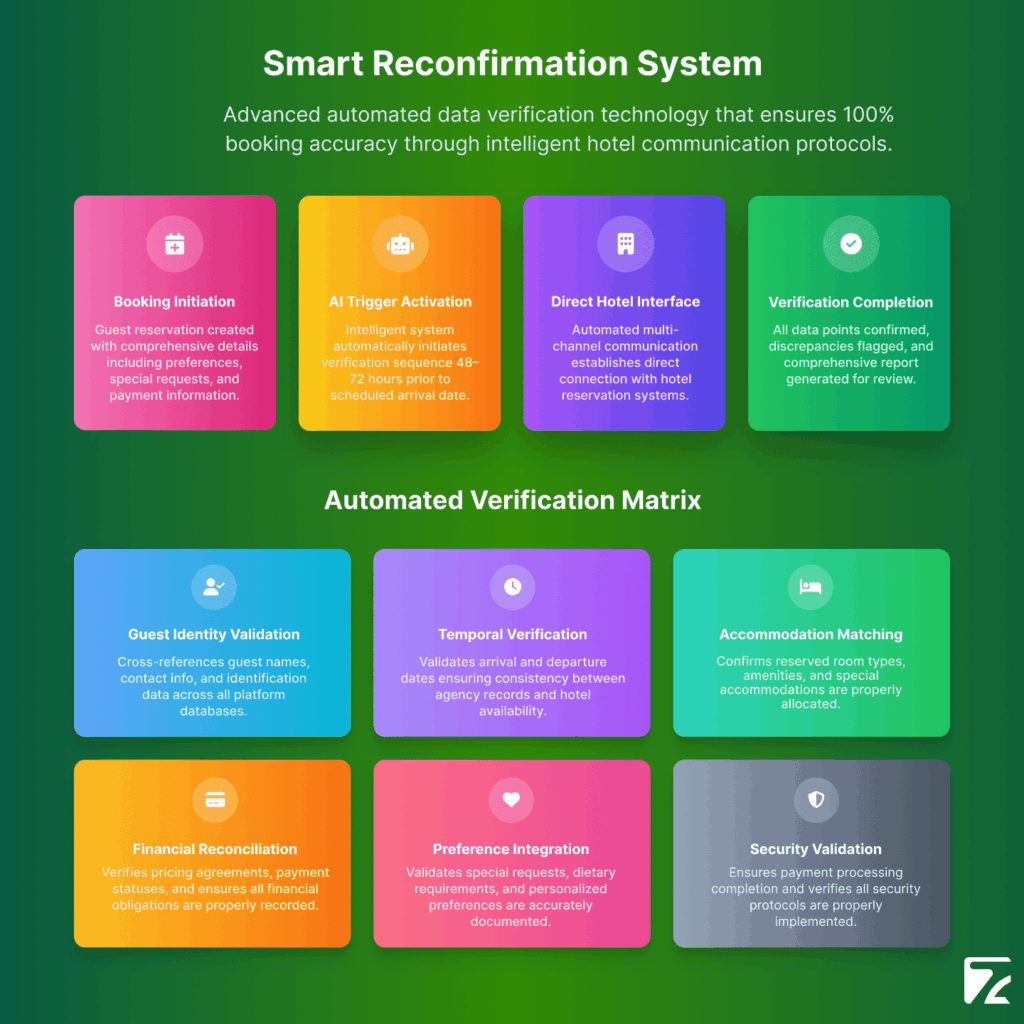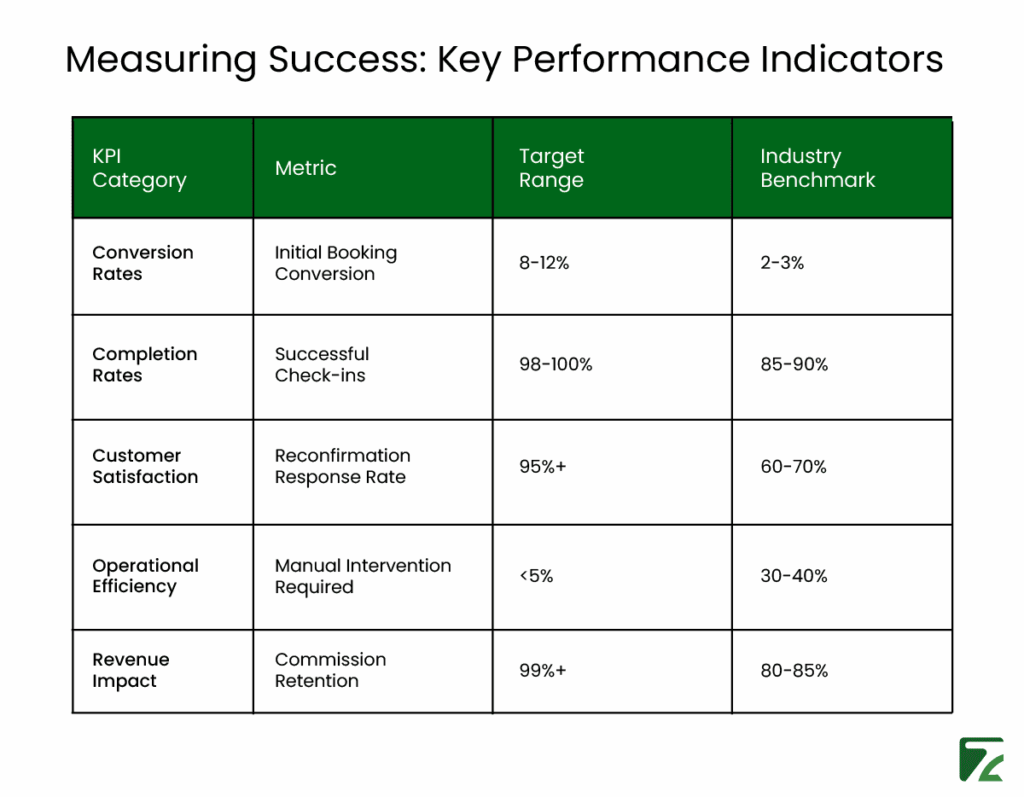In the ultra-competitive travel environment of today, nearly perfect booking completion rates are not just a goal they are a survival necessity. Travel companies are confronted with never-before-seencircumstances the average cart abandonment rate for OTAs alone exceeds 81%, an estimated billion left on the table. But smart agencies are finding that reconfirmation systems can be the game-changer that turns unconfirmed bookings into revenue.
This all inclusive guide demonstrates how traditional travel agencies can use intelligent reconfirmation technology to achieve 100%+ completion rates, in turn making the industry’s biggest pain point into their most significant competitive advantage.
The online travel booking market is expanding at breakneck speed, with global online travel estimated to be worth $512.5 billion USD by 2023 and expected to grow to $1.26 trillion by 2032. But beyond these impressive figures lies a grim reality:most potential bookings never convert to actual reservations.
The average hotel website conversion rate falls between 1.5% to 2.5%. Or in other words: as much as 97% of visitors are leaving your site without making a reservation. That’s a high opportunity cost for travel agencies. When you consider in that nearly 60% of hotel reservations are now booked online, the financial reward from increasing your conversion rate is quite apparent.
This isn’t just about first-time conversions. When they do get a reserved booking, massive issues, such as overbooking or technical problems, can ruin the consumer experience. Hotels sometimes oversell the number of reservations relative to rooms, with the anticipation of offsetting last-minute cancellations, a potential disaster for agencies and their clients.
Smart hotel booking reconfirmation changes the way travel agencies manage bookings. Unlike typical confirmation emails that serve solely to register a reservation, smart reconfirmation systems dynamically verify and validate and optimize every detail of a reservation.
Hotel booking reconfirmation is not limited to the first confirmation email that you receive upon booking your hotel. It’s also a smart way taken by your travel agency to verify every small detail directly with the hotel. This operation also serves as a catch-all safety net that catches potential problems before it affects the customer experience
Modern hotel booking reconfirmation systems use AI and automation to effortlessly manage the process. The new solution draws on artificial intelligence which emulates a human voice and automates the process of reconfirming a booking in order to boost efficiency and accuracy. Such systems can manage thousands of reconfirmations each day without human intervention, yet with the personal touch that customers demand.

Smart hotel booking reconfirmation systems are just for one critical purpose data verification automation. This simple and precise checks bring about accuracy in reservations, without making it excessively complex.
Smart hotel booking reconfirmation systems automatically cross-reference and verify booking details across multiple databases and platforms. The verification process includes:
The system checks these automatically, generally 48-72 hours prior to arrival, often via an automated phone call, email or online confirmation system to check all booking information is accurate and mirrored in the hotel’s reservation system. This automatic process cancels unnecessary verification calls and cuts the possibility of errors which could cause trouble upon checking in.
Technology Infrastructure Assessment Start with evaluating your current booking and customer management systems. An auto travel system grabs attention and time answering all your questions. Increase your production and efficiency. Ensure your infrastructure is capable of real-time data sync and automated communication.
Staff Training and Change Management While automation takes care of the routine, human skills are necessary for tasks that are complex. You teach your team to operate within intelligent systems which will enable you to focus on relationship building and problem solving instead of manual conforming.
Direct Hotel Connectivity Communicate directly with hotels to confirm reservation details. This involves automated systems that can contact hotels directly via phone, email, or online portals to confirm reservation details without the need for complicated technical integrations.
Data Standardization Use the same information format for all platforms in order to facilitate smooth information transits and avoid making mistakes that result in disrupted bookings.
Rule-Based Processing Set up straightforward automation for everyday situations:
AI-Powered Decision-Making let machine-learning models sharpen accuracy year after year:
To track the effectiveness of your smarthotel booking reconfirmation system, monitor these critical metrics:

Travelers today want to communicate on their terms. Voice tech that sounds human. We’re talking about one of those telephone calls that actually sounds like a real person, confirming with the hotels in their language (or format of choice). Implement omnichannel communications tactics such as:
Smart retries. The system does not just give up if the first verification tries to fail. It knows when and how to try again later, maybe at a different time, or elascate if there’s no other choice. These high‐end solutions that learn from failed attempts and adapt the method toward bomb‐free solutions.
Agencies that have introduced smart hotel booking reconfirmation systems are experiencing a revolution in their operations. Some reports recently have shown that travel companies applying automation across all three areas have achieved significant results. Efficiency increases by more than a third, and almost 40% fewer errors are made in booking.
The easing of manual work frees up the staff to concentrate on high-value work:
Smart hotel booking reconfirmation systems secure revenue in a number of ways:
Loyal customers spend 22.4% more and stay 28% longer so an investment in reconfirmation systems is particularly beneficial for long term growth.
And the impact on customer satisfaction is immeasurable. By confirming everything twice, you’re telling your clients you want their trip to go well. This creates trust and further solidifies the relationship (and possible extra bookings through you during reconfirmation)!
Customers value proactive communication and problem avoidance. This leads to:
Conduct a full review of existing booking systems. Identify areas of pain and bottlenecks. Determine if the existing technology can meet new requirements. Check your client’s feedback and recent complaints.
Create specific, numerical goals for booking completion percentages. Agree on customer-satisfaction benchmarks. Set targets for staff and system response time efficiency. Sketch ROI as soon as possible in monetary terms.
Survey the market for suitable software packages. Arrange and observe hands-on demonstrations. Test integration of each of them with your existing tools. Rate providers on scalability and future-proof potential.
List the requirements that off-the-shelf products will not meet. Design wireframes of a user-friendly interface. Map each data integration touchpoint. Develop a written process for user acceptance testing.
Choose a small, prototypical booking flow. Begin the pilot and view performance immediately. Collect comments from front-line users. Adjust the rules and the settings according to feedback.
Scale the system to all online and offline channels. Teach employees by demonstration and pocket guides. Activate automatic monitors and dashboards. Provide known support contacts, and where to escalate to.
Review on how good the key performance indicators are being kept to. Find spots where the system could work even better. Outline
the technical improvements that’ll fix these issues. Develop a plan to scale services to new users or geographies.
Schedule regular maintenance to keep the platform running smoothly. Lay out new features in immediate reply to users request. Modify tools and techniques to keep pace with market changes. Plan for hardware and software updates that keep ahead of the curve.
For travel agencies ready to adopt smart reconfirmation technology, getting 100% hotel booking reconfirmation fulfilment ratio is no longer a pipe dream; it’s within reach. When you combine AI, automation and human expertise with your systems, you have a force multiplier for protecting revenue, improving customer satisfaction, and optimizing the business.
The travel industry’s digital revolution driven by recent world events presents challenges and opportunities. Agencies that commit to smart hotel booking reconfirmation systems are taking a stand not just to survive, but to excel in an increasingly competitive space.
Think about it: good reviews are a treasure for travel agencies! Reconfirmation spares you of those bad reviews by catching any mistakes before they lead to frustration. Through avoiding issues that would directly affect customers, such agencies develop reputation and loyalty that directly lead to business expansion.
The question isn’t whether to adopt smart hotel booking reconfirmation systems, but the speed you can do so to take advantage of the competitive efficiencies they yield. In a sector where customer experience is the key differentiator,smart hotel reconfirmation is the difference between average service and high performance
A smart hotel booking reconfirmation system is an AI-driven solution that automatically verifies hotel bookings with the property before the guest arrives. It ensures that all reservation details like guest names, dates, room types, and payment are accurate, reducing errors and enhancing reliability for travel agencies and OTAs.
These systems pull booking data from the agency’s platform and use automated communication (calls, emails, APIs) to confirm details directly with the hotel. If discrepancies arise or confirmation fails, the system retries or escalates to a human agent.
Manual hotel booking reconfirmation is time-consuming, costly, and error-prone. Smart systems automate this process, prevent last-minute booking failures, and free up staff for higher-value tasks ultimately improving service quality and protecting revenue.
They reduce operational workload, improve booking accuracy, scale effortlessly during peak periods, and enhance customer satisfaction by ensuring a seamless check-in experience. They also minimize costly rebooking or compensation scenarios.
Agencies typically see ROI within 4–6 months by cutting manual labor costs and reducing booking errors. The system also preserves commission revenue by preventing cancellations and helps retain customers through better service reliability.

Travel Automation Expert